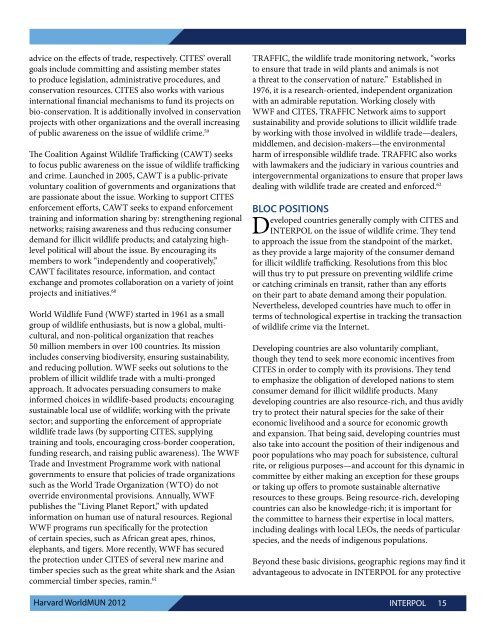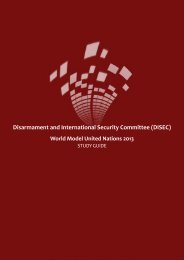INTERPOL - World Model United Nations
INTERPOL - World Model United Nations
INTERPOL - World Model United Nations
Create successful ePaper yourself
Turn your PDF publications into a flip-book with our unique Google optimized e-Paper software.
advice on the eects of trade, respectively. CITES’ overall<br />
goals include committing and assisting member states<br />
to produce legislation, administrative procedures, and<br />
conservation resources. CITES also works with various<br />
international nancial mechanisms to fund its projects on<br />
bio-conservation. It is additionally involved in conservation<br />
projects with other organizations and the overall increasing<br />
of public awareness on the issue of wildlife crime. 59<br />
e Coalition Against Wildlife Tracking (CAWT) seeks<br />
to focus public awareness on the issue of wildlife tracking<br />
and crime. Launched in 2005, CAWT is a public-private<br />
voluntary coalition of governments and organizations that<br />
are passionate about the issue. Working to support CITES<br />
enforcement eorts, CAWT seeks to expand enforcement<br />
training and information sharing by: strengthening regional<br />
networks; raising awareness and thus reducing consumer<br />
demand for illicit wildlife products; and catalyzing highlevel<br />
political will about the issue. By encouraging its<br />
members to work “independently and cooperatively,”<br />
CAWT facilitates resource, information, and contact<br />
exchange and promotes collaboration on a variety of joint<br />
projects and initiatives. 60<br />
<strong>World</strong> Wildlife Fund (WWF) started in 1961 as a small<br />
group of wildlife enthusiasts, but is now a global, multicultural,<br />
and non-political organization that reaches<br />
50 million members in over 100 countries. Its mission<br />
includes conserving biodiversity, ensuring sustainability,<br />
and reducing pollution. WWF seeks out solutions to the<br />
problem of illicit wildlife trade with a multi-pronged<br />
approach. It advocates persuading consumers to make<br />
informed choices in wildlife-based products; encouraging<br />
sustainable local use of wildlife; working with the private<br />
sector; and supporting the enforcement of appropriate<br />
wildlife trade laws (by supporting CITES, supplying<br />
training and tools, encouraging cross-border cooperation,<br />
funding research, and raising public awareness). e WWF<br />
Trade and Investment Programme work with national<br />
governments to ensure that policies of trade organizations<br />
such as the <strong>World</strong> Trade Organization (WTO) do not<br />
override environmental provisions. Annually, WWF<br />
publishes the “Living Planet Report,” with updated<br />
information on human use of natural resources. Regional<br />
WWF programs run specically for the protection<br />
of certain species, such as African great apes, rhinos,<br />
elephants, and tigers. More recently, WWF has secured<br />
the protection under CITES of several new marine and<br />
timber species such as the great white shark and the Asian<br />
commercial timber species, ramin. 61<br />
TRAFFIC, the wildlife trade monitoring network, “works<br />
to ensure that trade in wild plants and animals is not<br />
a threat to the conservation of nature.” Established in<br />
1976, it is a research-oriented, independent organization<br />
with an admirable reputation. Working closely with<br />
WWF and CITES, TRAFFIC Network aims to support<br />
sustainability and provide solutions to illicit wildlife trade<br />
by working with those involved in wildlife trade—dealers,<br />
middlemen, and decision-makers—the environmental<br />
harm of irresponsible wildlife trade. TRAFFIC also works<br />
with lawmakers and the judiciary in various countries and<br />
intergovernmental organizations to ensure that proper laws<br />
dealing with wildlife trade are created and enforced. 62<br />
BLOC POSITIONS<br />
Developed countries generally comply with CITES and<br />
<strong>INTERPOL</strong> on the issue of wildlife crime. ey tend<br />
to approach the issue from the standpoint of the market,<br />
as they provide a large majority of the consumer demand<br />
for illicit wildlife tracking. Resolutions from this bloc<br />
will thus try to put pressure on preventing wildlife crime<br />
or catching criminals en transit, rather than any eorts<br />
on their part to abate demand among their population.<br />
Nevertheless, developed countries have much to oer in<br />
terms of technological expertise in tracking the transaction<br />
of wildlife crime via the Internet.<br />
Developing countries are also voluntarily compliant,<br />
though they tend to seek more economic incentives from<br />
CITES in order to comply with its provisions. ey tend<br />
to emphasize the obligation of developed nations to stem<br />
consumer demand for illicit wildlife products. Many<br />
developing countries are also resource-rich, and thus avidly<br />
try to protect their natural species for the sake of their<br />
economic livelihood and a source for economic growth<br />
and expansion. at being said, developing countries must<br />
also take into account the position of their indigenous and<br />
poor populations who may poach for subsistence, cultural<br />
rite, or religious purposes—and account for this dynamic in<br />
committee by either making an exception for these groups<br />
or taking up oers to promote sustainable alternative<br />
resources to these groups. Being resource-rich, developing<br />
countries can also be knowledge-rich; it is important for<br />
the committee to harness their expertise in local matters,<br />
including dealings with local LEOs, the needs of particular<br />
species, and the needs of indigenous populations.<br />
Beyond these basic divisions, geographic regions may nd it<br />
advantageous to advocate in <strong>INTERPOL</strong> for any protective<br />
Harvard <strong>World</strong>MUN 2012 <strong>INTERPOL</strong> 15

















